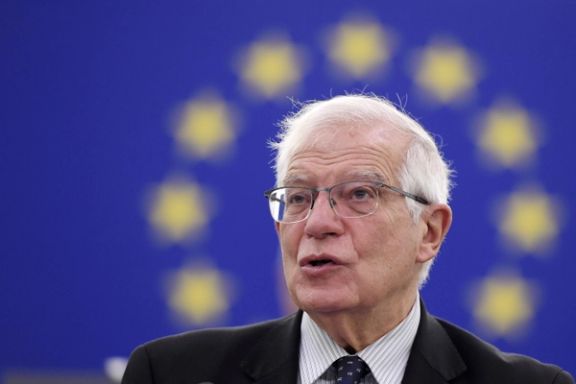US Role Unclear As EU Confirms Nuclear Talks With Iran In Brussels

EU Foreign Policy Chief Josep Borrell said Friday that he would meet with Iranian diplomats for nuclear talks in Brussels instead of Vienna, the main venue of talks.

EU Foreign Policy Chief Josep Borrell said Friday that he would meet with Iranian diplomats for nuclear talks in Brussels instead of Vienna, the main venue of talks.
Enrique Mora, the EU coordinator of the Iran nuclear talks in Vienna, has failed in a visit to Tehran to agree a concrete date for resuming negotiations.
Mora met Thursday with Ali Bagheri, a new deputy foreign minister who appears to lead for Iran’s new administration on the nuclear issue, to discuss stalled efforts to revive Iran’s 2015 nuclear deal with world powers, the JCPOA (Joint Comprehensive Plan of Action).
The Iranian foreign ministry after the meeting said in a statement there had been agreement to continue dialogue in Brussels in coming days.
Borrell said that Iran wants to meet in Brussels with EU officials who are coordinating indirect talks between the United States and Iran along with some other parties to the 2015 nuclear deal.
There was no mention of a US presence if a meeting takes place in brussels, which would mean that Iran in effect stops the process of indirect talks with the Biden Administration.
Borrell told reporters in Washington that he was ready to meet the Iranians, but could not say when that might happen.
"I am ready to receive them, if needed," Borrell said, adding that he did not think talks in Brussels were absolutely necessary but that he had to be willing to be somewhat "patient on this issue, because we cannot afford to fail."
Not yet ready
An EU official said that while Tehran was “not yet ready for engaging in Vienna” it was “absolutely decided to go back to Vienna…They insisted they want practical talks…with a final agreement on how to bring the JCPOA back to life.”
The Vienna talks were suspended in June for Iran’s presidential election and transition to the administration of President Ebrahim Raisi (Raeesi). Tehran has insisted it needs time to review the process.
Signaling growing impatience in Europe, a French foreign ministry spokesman said Friday Iran needed to show by action its willingness to resume talks.With European Union foreign policy chief Josep Borrell in Washington for soundings, his spokesman Peter Stano said Thursday: “We are awaiting the Iranians' response…There is an urgent need to resume discussions very soon."
“If Iran demands more or offers less, these negotiations will not succeed," US Press Secretary Jen Psaki said in her Thursday briefing, adding that she was not going to "get into hypotheticals.”
Washington takes part in the Vienna talks only indirectly, although removing US sanctions are Iran’s key demand. President Joe Biden has continued ‘maximum pressure’ sanctions against Iran despite his campaign pledge to return to JCPOA, from which President Donald Trump withdrew the US in 2018.
Good-will gesture
Iran’s foreign minister Hossein Amir-Abdollahian last week said he had suggested to the US that they release $10 billion of Tehran’s blocked funds as a good-will gesture. There have also been reports that Iran wants guarantees the US would not again leave any agreement and re-impose sanctions.
In a tweet Mikhail Ulyanov, Russia’s envoy in Vienna, said that Amir-Abdollahian and Russian foreign minister Sergei Lavrov had reaffirmed in a phone call Thursday that restoring the JCPOA "in initial configuration" was the only way to “ensure all parties' rights and interests." Moscow is committed to the original logic of the JCPOA as a non-proliferation agreement and has distanced itself from reports that the US wants to include defense and security issues in the talks.
In another tweet, reacting to remarks from Mora Thursday, Ulyanov stressed Moscow’s shared position with the Europe while noting Russia saw "no reason for pessimism."
Other options
On Wednesday, US Secretary of State Antony Blinken and his British, French and German counterparts all described Mora’s trip as critical in bringing Iran back to the table. Blinken said the US would look to “other options” if Iran refused to cut its nuclear program back to JCPOA limits, which Tehran began to exceed in 2019 in response to US ‘maximum pressure’ sanctions.
In an interview Tuesday Rob Malley, the US special envoy on Iran, said Washington wanted to “get back to the JCPOA to calm things down,” but there has also been wide media coverage of US-Israel consultation, with former Mossad chief Yossi Cohen stressing Israel’s option of bombing Iran’s nuclear sites.